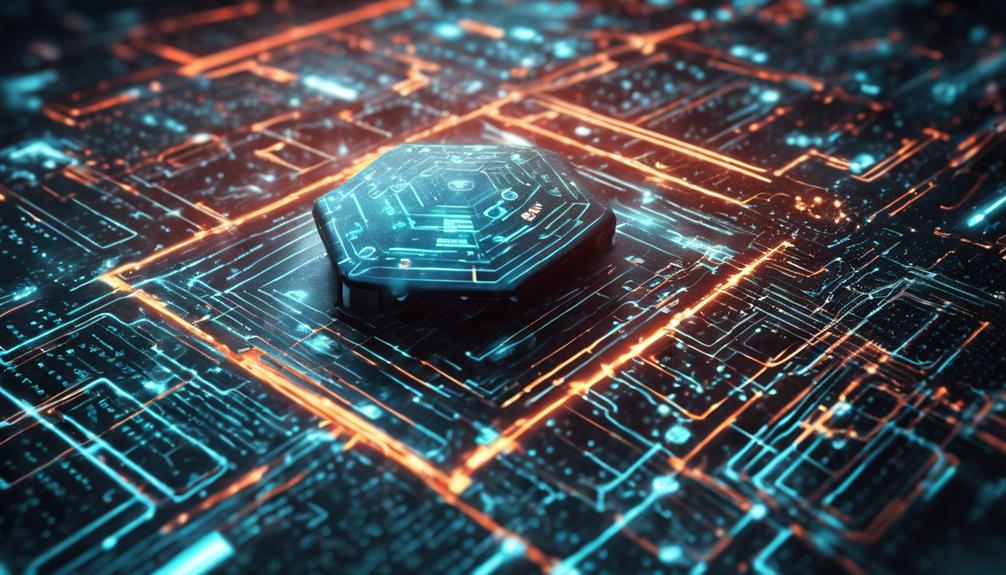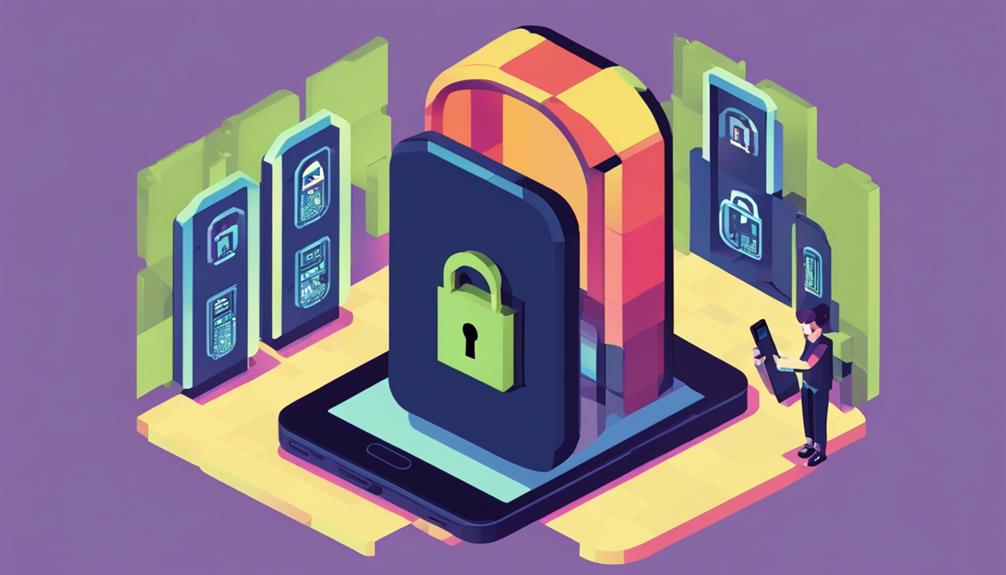Cryptocurrency's safety from hackers isn't absolute. While blockchain technology provides encryption and decentralization, vulnerabilities exist. Phishing, exchange breaches, wallet weaknesses, and smart contract flaws are common areas of attack. Centralized exchanges like Mt. Gox have been prime hacking targets. Strategies like hardware wallets, two-factor authentication, and software updates enhance security. Recent incidents like the Poly Network hack underscore ongoing risks. Implementing best practices is essential in safeguarding digital assets. Further insights on securing cryptocurrency await those seeking a deeper understanding of protection measures.
Key Takeaways
- Cryptocurrency is vulnerable to hacking.
- Secure storage methods can mitigate risks.
- Implementing strong security measures is crucial.
- Regularly update wallets and use reputable platforms.
- Vigilance against phishing and scams is essential.
Blockchain Security Measures
Blockchain security measures are inherently robust and are pivotal in safeguarding cryptocurrency transactions from potential hacker threats. The utilization of encryption and consensus protocols within blockchain technology creates a decentralized system that is challenging for hackers to breach. The distributed nature of blockchain ensures that no single point of failure exists, making it resistant to traditional hacking attempts. Additionally, the transparency of blockchain allows for all transactions to be recorded and verified by network participants, further enhancing security.
The consensus protocol in blockchain plays an essential role in validating transactions securely, ensuring that all network participants agree on the accuracy of the ledger. This decentralized validation process strengthens the overall security of blockchain networks, making it highly resilient to hacking attempts. Large blockchains like Bitcoin have never been successfully hacked, showcasing the effectiveness of these security measures in protecting crypto assets from malicious actors.
Common Cryptocurrency Attack Vectors

Common cryptocurrency attack vectors encompass a range of tactics used by hackers to exploit vulnerabilities in the digital asset ecosystem. Phishing attacks lure users into disclosing sensitive information through deceptive emails and websites.
Exchange breaches target platforms to siphon off funds stored by users, while wallet vulnerabilities can lead to the compromise of private keys and credentials essential for securing cryptocurrencies.
Phishing Attacks
Phishing attacks represent a prevalent method employed by hackers to deceive individuals and illicitly obtain sensitive information within the domain of cryptocurrency. These attacks often involve fraudulent emails or messages that mimic legitimate sources, aiming to trick individuals into revealing private keys or login credentials.
Once hackers acquire this sensitive information, they can access wallets, exchange accounts, or other cryptocurrency platforms, potentially leading to significant financial losses for the victims.
To prevent falling prey to phishing attacks, it is essential for users to verify the legitimacy of all communications received. Avoid clicking on suspicious links and refrain from providing personal information in response to unsolicited requests. Vigilance and caution are key in safeguarding oneself against these deceptive tactics.
Exchange Breaches
Security breaches on cryptocurrency exchanges continue to pose a significant threat to the digital assets held by users worldwide. Hackers exploit vulnerabilities in exchange security systems to target digital assets, leading to substantial financial losses through stolen funds.
Notable incidents like Mt. Gox and Coincheck have underscored the dire consequences of exchange breaches, emphasizing the importance of implementing robust security measures within the cryptocurrency space. These breaches not only result in financial losses but also raise concerns about customer data leaks and reputational damage for the affected exchanges.
To mitigate these risks, it is essential for exchanges to prioritize stringent security protocols and conduct regular system audits to identify and address any potential weaknesses promptly. By enhancing their security measures and staying vigilant against evolving cyber threats, cryptocurrency exchanges can better safeguard users' digital assets and uphold trust within the crypto community.
Wallet Vulnerabilities
Moreover, cryptocurrency wallets are frequently targeted by hackers due to vulnerabilities like private key exposure, making them a prime focus for malicious attacks aiming to steal digital assets.
Hot wallets, which are connected to the internet for easier transactions, are more susceptible to breaches compared to cold wallets stored offline.
Phishing attacks pose a significant threat to wallet holders, as hackers employ deceptive tactics to trick individuals into revealing their private keys or personal information.
Centralized exchanges, holding vast sums of cryptocurrency, become lucrative targets for cybercriminals seeking to exploit vulnerabilities in their systems.
Additionally, smart contracts, integral to many blockchain platforms, can be prone to attacks if developers overlook critical details in the code, potentially resulting in substantial financial losses for users.
It is essential for cryptocurrency users to remain vigilant and employ stringent security measures to safeguard their digital assets from the various vulnerabilities posed by hackers in the evolving landscape of digital finance.
Vulnerabilities in Crypto Wallets

Crypto wallets, whether online or offline, face vulnerabilities that hackers exploit, especially through phishing and scams.
Protecting private keys is essential to prevent unauthorized access and potential theft of cryptocurrency assets.
Industry recommendations include using secure storage devices like encrypted USB thumb drives to enhance wallet security.
Wallet Security Measures
Given the growing concern over the vulnerability of cryptocurrency wallets, it is essential to address the potential risks associated with storing private keys. Private key storage is a critical aspect of wallet security, as unauthorized access can lead to theft of cryptocurrency funds. Hot wallets, which are connected to the internet, are particularly susceptible to online exposure and unauthorized access. On the other hand, cold storage options like hardware wallets provide a more secure means of safeguarding private keys from potential breaches.
To explore further into the vulnerabilities and security measures associated with cryptocurrency wallets, let's examine the following table:
| Vulnerabilities | Security Measures |
|---|---|
| Storage of private keys | Use hardware wallets |
| Hot wallets | Implement cold storage |
| Online exposure | Maintain access control |
| Unauthorized access | Safeguard private keys |
| Potential theft | Secure cryptocurrency funds |
Phishing and Scams
Phishing attacks pose a significant threat to the security of cryptocurrency wallets, targeting crypto wallet holders through deceptive tactics to acquire personal information and private keys. Scammers often create fake websites or send misleading emails, deceiving users into disclosing sensitive data. These vulnerabilities in crypto wallets make them attractive targets for hackers looking to steal funds.
To safeguard against such threats, it is essential for users to be educated on recognizing phishing attempts and securing their private keys effectively. Verifying the authenticity of websites and messages is vital in preventing individuals from falling victim to these scams.
As the crypto space continues to evolve, staying vigilant and informed about potential risks is paramount in ensuring the safety of one's digital assets. Education and awareness play a pivotal role in mitigating the risks associated with phishing attacks and scams in the cryptocurrency domain.
Private Key Protection
Private key security stands as a critical aspect of safeguarding cryptocurrency assets, necessitating robust protection measures against unauthorized access.
In the realm of Bitcoin and other cryptocurrencies, private keys are fundamental for accessing and managing funds securely. Wallets, whether in the form of hot (online) or cold (offline) storage, play a pivotal role in storing these private keys.
Unfortunately, wallets are prime targets for hackers seeking to gain illicit access to valuable cryptocurrencies. Exchanges, which often hold users' private keys in a custodial capacity, are particularly vulnerable to hacking incidents, making them attractive targets for cybercriminals.
To enhance security and prevent unauthorized access, individuals are advised to utilize commercially manufactured hardware wallets or encrypted USB thumb drives for the secure storage of their private keys.
Safeguarding private keys is paramount, as they are akin to protecting personal information and are indispensable for securing and controlling cryptocurrency assets effectively.
Risks of Centralized Exchanges
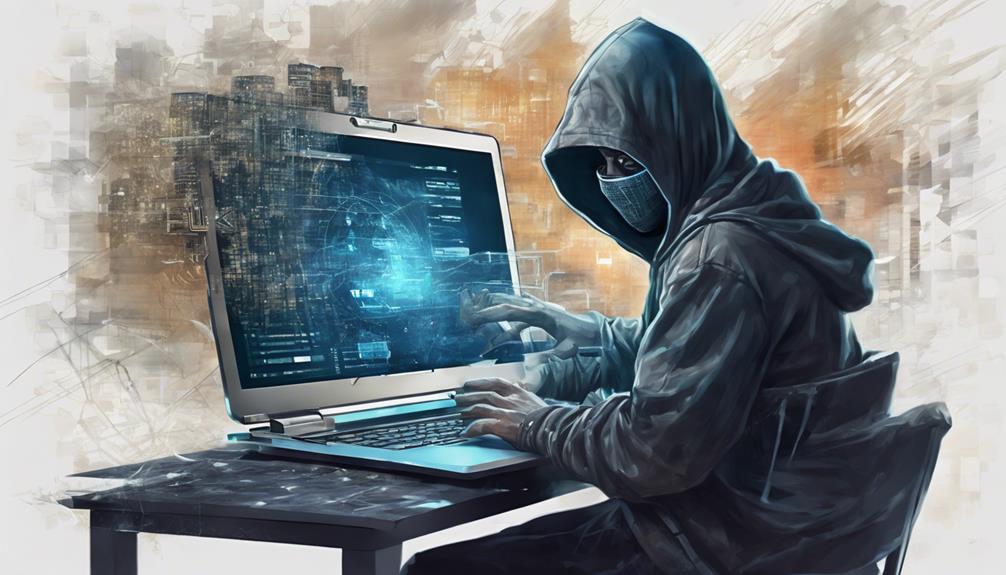
Centralized exchanges pose a significant risk to cryptocurrency holders due to their susceptibility to targeted hacking attacks. These exchanges, such as Mt. Gox and Coincheck, have been prime targets for hackers due to the concentration of funds within a single entity. The lack of control over private keys on centralized exchanges further exacerbates the risks, as users are reliant on the platform's security measures.
Security breaches on these exchanges have led to substantial theft and vulnerabilities, resulting in billions of dollars in losses for users over the years. The centralized nature of these exchanges means that users must trust the platform to safeguard their funds, making them vulnerable to large-scale hacks.
In contrast, decentralized exchanges offer a more secure alternative by allowing users to retain control of their funds. By reducing the risk of centralized control and potential security breaches, decentralized exchanges provide a safer environment for cryptocurrency transactions.
Impact of Smart Contract Flaws
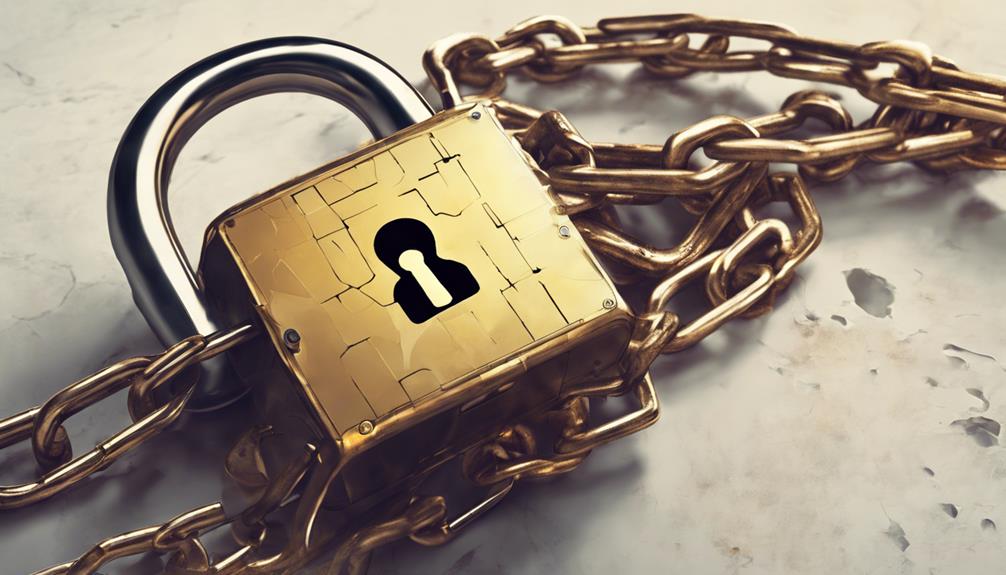
Smart contract flaws have become a significant concern in the cryptocurrency space, leading to substantial losses and vulnerabilities in decentralized finance (DeFi) platforms. In 2023, these flaws were a prevalent attack vector in DeFi hacking incidents, resulting in compromised smart contracts and exploited vulnerabilities.
The surge in DeFi hacks has underscored the critical role of secure coding practices in fortifying smart contract security. Especially, on-chain vulnerabilities within smart contracts have fueled the increase in hacking activity within the DeFi sector, emphasizing the pressing need for enhanced security measures.
To mitigate the impact of smart contract flaws on cryptocurrency safety, improvements in smart contract security are imperative. By addressing these vulnerabilities and adopting rigorous security protocols, the cryptocurrency community can bolster the resilience of DeFi platforms against malicious actors.
As the industry continues to evolve, prioritizing smart contract audits, rigorous testing, and ongoing security enhancements will be pivotal in safeguarding the integrity of the decentralized financial ecosystem.
Cross-Chain Bridge Security Concerns

Highlighting the critical importance of securing cross-chain bridges in the cryptocurrency ecosystem, concerns arise due to potential vulnerabilities that can compromise asset transfers between different blockchains.
Cross-chain bridges serve as pivotal linkages enabling the seamless movement of assets across disparate blockchain networks. However, the security of these bridges is a pressing issue, with vulnerabilities in smart contracts, network connections, and overall infrastructure opening doors to potential hacks and asset theft.
Incidents like the Poly Network hack in 2021 underscore the real risks faced by users and projects utilizing cross-chain bridges.
To address these security concerns, rigorous audits, bug bounties, and robust security protocols are imperative. Thorough code reviews, continuous monitoring, and proactive measures play a crucial role in fortifying the resilience of cross-chain bridges against malicious actors.
Strategies to Secure Your Crypto Assets
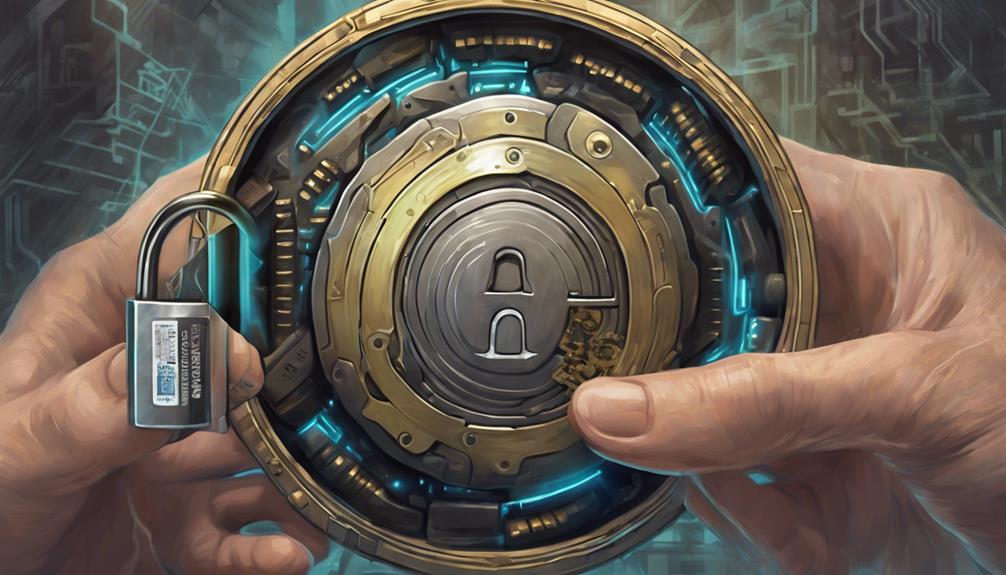
Addressing the importance of safeguarding cryptocurrency holdings, implementing effective security measures is vital to protect against potential threats and vulnerabilities.
To secure your crypto assets, consider using hardware wallets such as Ledger or Trezor to store private keys offline, shielding them from unauthorized access. Additionally, enabling two-factor authentication (2FA) on your accounts adds an important extra layer of security.
Regularly updating your software and opting for reputable wallets are essential steps to fortify defenses against vulnerabilities that hackers might exploit. Avoid sharing private keys or personal information online to prevent compromising your holdings.
Stay vigilant against phishing emails and suspicious links, as they could lead to unauthorized individuals gaining access to your crypto assets. By adopting these strategies, you can greatly enhance the security of your cryptocurrency investments and reduce the risk of potential breaches.
Notable Crypto Platform Hacking Incidents

Numerous significant hacking incidents have impacted various cryptocurrency platforms, leading to substantial losses and raising concerns about the security of digital assets.
- Mt. Gox, a prominent cryptocurrency exchange, faced a security breach in 2014, resulting in the loss of over 850,000 bitcoins.
- Binance, one of the largest cryptocurrency exchanges globally, encountered a security breach in 2019, where hackers managed to steal 7,000 bitcoins.
- The DAO, a decentralized autonomous organization running on the Ethereum blockchain, fell victim to a hack in 2016, causing a loss of $50 million worth of ether.
These incidents underscore the vulnerabilities that cryptocurrency exchanges face against malicious actors seeking to exploit weaknesses in their systems.
The thefts from platforms like Bitfinex and Coincheck further highlight the critical importance of robust security measures in protecting users' funds and maintaining trust in the cryptocurrency ecosystem.
Investors and users must remain vigilant and follow best security practices to mitigate the risks associated with potential security breaches.
Safest Practices for Bitcoin Protection

In light of the vulnerabilities exposed by notable cryptocurrency platform hacking incidents, implementing secure practices for Bitcoin protection is crucial for safeguarding digital assets. Safeguarding Bitcoin involves a combination of cold storage, where private keys are kept offline in secure environments such as fire-proof safes or deposit boxes, and hot wallets for frequent transactions, with keys transferred only when necessary.
Regularly backing up private keys and conducting storage checks are vital to guarantee security measures remain intact. Additionally, considering insurance options against Bitcoin theft can provide an added layer of protection to safeguard investments.
Hardware wallets offer effective defense against potential hacking threats by securely storing private keys offline. By adopting these practices, individuals can enhance the security of their Bitcoin holdings, reducing the risk of unauthorized access and potential loss.
Frequently Asked Questions
Is Cryptocurrency Really Secure?
Cryptocurrency security stands on blockchain technology's robustness, offering decentralized and encrypted transactions. While vulnerabilities like private key storage exist, implementing stringent security measures can enhance protection. Overall, cryptocurrency's security is continually evolving and improving.
Why Do Hackers Use Cryptocurrency?
Hackers use cryptocurrency due to its pseudo-anonymous nature, facilitating untraceable transactions for ransomware attacks. The decentralized, borderless, and encrypted nature of cryptocurrencies enables global operations with enhanced security and privacy, attracting cybercriminals seeking to evade detection.
How Often Do Crypto Wallets Get Hacked?
How often do crypto wallets get hacked? Cryptocurrency wallets face frequent hacking incidents, with 192 reported in 2022 alone. Hackers exploit vulnerabilities through various methods, including phishing and malware attacks, to access private keys and steal funds.
Have People Lost Money in Crypto?
People have lost significant amounts of money in the cryptocurrency space, with over $16 billion stolen in the past decade. Issues like exchange hacks and phishing attacks have contributed to these losses, highlighting the importance of security measures and awareness.
Conclusion
To sum up, while cryptocurrency offers innovative solutions and potential for financial growth, it is not immune to the threats posed by hackers.
By implementing robust security measures and staying informed about potential risks, users can better protect their digital assets.
Remember, in the ever-changing landscape of cryptocurrency, vigilance is key to safeguarding your investments from malicious actors.
Stay informed, stay vigilant, and stay secure in the world of digital finance.

